

Untitled. Types of Stressors. A stressor is anything that causes the release of stress hormones.
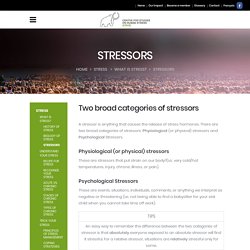
There are two broad categories of stressors: Physiological (or physical) stressors and Psychological Stressors. Physiological (or physical) stressors These are stressors that put strain on our body? (i.e.: very cold/hot temperatures, injury, chronic illness, or pain). Psychological Stressors These are events, situations, individuals, comments, or anything we interpret as negative or threatening (i.e.: not being able to find a babysitter for your sick child when you cannot take time off work). Scientists are now proposing that stressors can be further divided into: Absolute Stressors These are stressors that everyone exposed to them would interpret as being stressful. Relative Stressors These are stressors that only some exposed to them would interpret as being stressful.
Untitled. Untitled. Untitled. Types of Stress. Psychological Stress, Psychosocial Stress and Psychospiritual Stress. Will Joel Friedman, Ph.D. is a seasoned clinician with experience working with adults, couples, families, adolescents and older children since 1976.
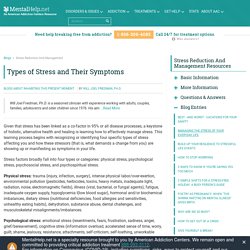
His aim...Read More. Acute Stress, Episodic Acute Stress and Chronic Stress. Understanding stress can help you know more quickly when you need help.
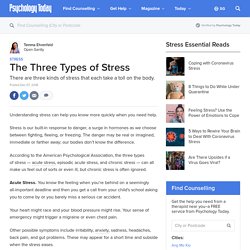
Stress is our built-in response to danger, a surge in hormones as we choose between fighting, fleeing, or freezing. The danger may be real or imagined, immediate or farther away; our bodies don’t know the difference. Five Signs of Senior Stress. Stress is a common factor in life.

Warning Signs of Stress in Seniors. Stress is something that we all encounter at some point in our lives.

Signs and Symptoms of Anxiety and Depression in Older People. Sources of Stress in the Elderly. We all need to face different kinds of mental stress in various stages of life.
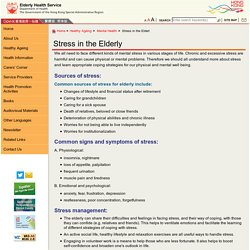
Chronic and excessive stress are harmful and can cause physical or mental problems. Therefore we should all understand more about stress and learn appropriate coping strategies for our physical and mental well being. Factors That Cause Stress For The Elderly. Stressed out Elderly Throughout our lifetime, there are changes and stressors that come with each life stage.
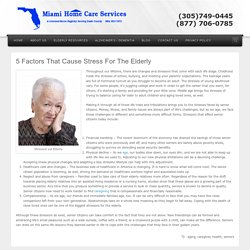
Childhood holds the stresses of school, bullying, and meeting your parents’ expectations. The teenage years are full of hormonal tumult as you struggle to become an adult. The stresses of young adulthood vary. For some people, it’s juggling college and work in order to get the career that you want; for others, it’s starting a family and providing for your little ones. Making it through all of those life trials and tribulations brings you to the stresses faced by senior citizens. Financial hardship – The recent downturn of the economy has drained the savings of those senior citizens who were previously well off, and many other seniors are barely above poverty levels, struggling to survive on dwindling social security benefits.Physical decline – As we age, our bodies slow down, our eyes dim, and we are not able to keep up with life like we used to.
Aging and Stress. By Chris Woolston, M.S.

At any age, stress is a part of life. Young and old alike have to face difficult situations and overcome obstacles. While young adults struggle to establish a career, achieve financial security, or juggle work and family demands, older people may face failing health or dwindling finances -- or simply the challenges of retaining their independence. Unfortunately, the body's natural defenses against stress gradually break down with age. But you don't have to give in to stress just because you're no longer young. Many seniors still manage to sail through their later years. 6 Effects of Stress on Aging Adults. Stress is a constant concern among the senior population due to issues like decreasing health, a lack of independence, boredom, and a diminished social life.

Chronic stress raises levels of cortisol, a hormone associated with elevated blood pressure, changes in metabolism, and increased blood sugar. These six senior health issues are often caused by stress. 1. Upset Stomach When seniors are stressed, they could end up with heightened levels of inflammation that have a direct effect on the delicate linings of the stomach and the intestines. 2. Constantly being stressed can lead to higher blood pressure and cholesterol levels, so seniors who are stressed are more at risk for issues like heart attacks and strokes. The Effects of Stress on Memory in Older Adults. Studies suggest that stress—both short-term and chronic—play a negative role in the memory performance of older adults.

Moderate amounts of stress, such as driving to an unfamiliar location to take a memory test, can produce test results similar to those of a patient with Alzheimer’s. A recent study carried out by Sophia Lupien’s team at the Centre for Studies on Human Stress (CSHS) of the Louis-H. Lafontaine Hospital, in affiliation with Université de Montréal, demonstrates that when seniors are tested under stressful circumstances, the release of stress hormones (cortisol) causes a rapid decline in memory performance. In the study, seniors took memory tests in both inconvenient locations, and familiar locations. Interestingly, when these same exams took place in familiar locations, their memory performance rivaled that of young adults. Stress Relief Tips for Older Adults.
Know the symptoms, get the treatment right for you Stress in adults, especially older adults, has many causes. You may experience it as a result of managing chronic illness, losing a spouse, being a caregiver, or adjusting to changes due to finances, retirement, or separation from friends and family. Fortunately, there are plenty of things you can do for stress relief. Tailor the treatment The type of stress relief that works best depends on what someone is experiencing. Stress Management for Senior Health. Stress management has been associated with increased senior health and well-being.
While retirement seems to be a time of little stress. After all, with job stress that’s been endured for decades out of the picture, one may wonder if there even is stress after retirement — senior stress can still originate from relationships, finances, and retirement itself, as well as from many other areas of life. The following are effective methods of stress management that may be especially conducive to senior health. Meditation Studies on meditation show that it can not only provide relief from stress when it is practiced but can help build a kind of immunity to future stress — your stress response may be triggered less often if you meditate regularly.
Cognitive Puzzles Solving Sudoku or crossword puzzles, or working on other thinking games can provide mental stimulation akin to ‘brain exercise.’ Yoga Breathing Exercises. Stress Management Guide for Seniors. It's easy to feel stressed on a daily basis—stress is normal even during your retirement years. Though it can be difficult to identify the cause for tension and worry, one thing is certain: stress can be detrimental to your health.
In fact, the National Institute of Mental Health finds that routine stress can "contribute to serious health problems, like heart disease, high blood pressure, diabetes and other illnesses, as well as mental disorders like depression or anxiety. " To avoid becoming stressed, try using our simple ways to reduce and manage it. Implementing even a few of these approaches can make a big impact on your overall health and well-being. If you’re weary of trying new physical and mental exercises, using a medical alert system like MobileHelp will keep you safe during any unanticipated events. Strategies for Empowering Your Aging Loved One. Glen describes his stress as “a feeling that someone is gripping the back of my neck tightly. And I’m so tense that I can’t even turn around to see who it is—if I wanted to.” He feels the stress of healthcare expenses, family drama, and even death as he’s dealing with more unfamiliar health challenges than ever before.
Maureen, on the other hand, says that when she’s stressed, “I just power through it, focusing only on what needs to get done. But then I crash, and sometimes it takes me days to recover in bed.” She feels the weight of continuing to host a book club in her home each week even after she took a bad fall and has had to use a walker, as well as her husband’s worsening dementia.